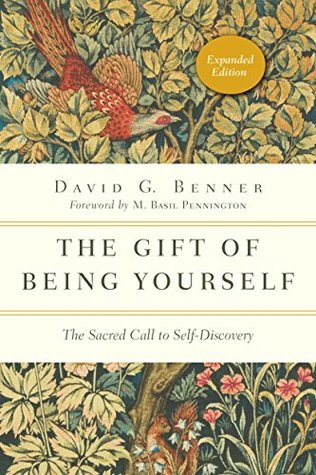More on this book
Community
Kindle Notes & Highlights
Read between
July 19, 2020 - July 14, 2023
it seems I put a spin on this as I shifted from seeking love to seeking respect,
My compulsive pursuit of accomplishments and the respect of people who are important to me suffocates the life of my true self.
Pennington suggests that the well-known account of the temptation of Jesus in the wilderness (Matthew 4:1-11) is best understood as his struggles with three major potential false selves.
Coming out of hiding is accepting God on God’s own terms. Doing so is the only route to truly being our unique self-in-Christ.
The true self is who, in reality, you are and who you are becoming. It is not something you need to construct through a process of self-improvement or deconstruct by means of psychological analysis.
We do not find our true self by seeking it. Rather, we find it by seeking God.
being fully human meant that he, like all humans, had to discover who he was.
These and numerous other potential identities were all available as distractions from Jesus’ true self. But he did not look to the expectations of others to understand who he was. Instead he looked to his relationship with God.
identity is not static. It always gives direction to how we live our life. The discovery of our true self does not simply produce freedom. It also generates vocation.
journey from loneliness to a love that grows in and through belonging,” a love that “liberates us from self-centred compulsions and inner hurts . . . that finds its fulfillment in forgiveness and in loving those who are our enemies.”4 This, and nothing less, is what is involved in the call to become fully human.
Genuine Christ-following will always make us more, not less, human.
“a creator God who molds humanity and all nature with loving intent, seeking the flourishing and fulfillment of all created things.”
Frederick Buechner means when he states that “the place God calls you to is the place where your deep gladness and the world’s deep hunger meet.”
Our vocation is always a response to a Divine call to take our place in the kingdom of God.
Calling brings freedom and fulfillment because it orients us toward something bigger than self.
Jesus’ humility. He knew that he was without sin and did not need the baptism of repentance. But involvement in his Father’s affairs included meeting the demands of righteousness.
This bold assertion of vocation came immediately on the heels of Jesus’ forty days of temptation in the wilderness (Luke 4:1-13).
while doing will always be involved, vocation is much more than our occupation. It is the face of Christ we are called from eternity to show to the world. It is who we are called to be.
My temperament, my personality, my abilities, and my interests and passions all say something about who I was called to be, not simply who I am. If I really believe that I was created by God and invited to find my place in his kingdom, I have to take seriously what God had already revealed about who I am.
his call is always absolutely congruent with our destiny, our truest self, our identity and the shape of our being.
But God does not only create us in uniqueness. God meets us in our uniqueness.
There has never been one standard way to meet God.
God meets us in our individuality because God wants to fulfill that individuality. God wants us to follow and serve in and through that individuality.
The spiritual life of one person should never be a carbon copy of that of another.
The discernment of our vocation is an ongoing, lifelong process. It is learning to live the truth of our being, not simply fill certain roles or accomplish certain expectations.
human transformation at its core is the transformation of identity, all other changes that are part of the transformational journey flow from this.
Although it could sound like a tautology, our identity is based on the things with which we most identify. For example, if we identify with power, our identity will be based on our sense of our power. Or if we identify with success, our identity will be based on our sense of our success.
God’s intended home is our heart, and it is meeting God in the depths of our soul that transforms us from the inside out. This is why the self is so important in the Christian transformational journey. It must be encountered, not bypassed. It must be embraced and deeply known if it is to be transformed.


